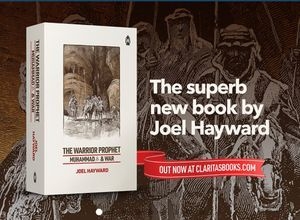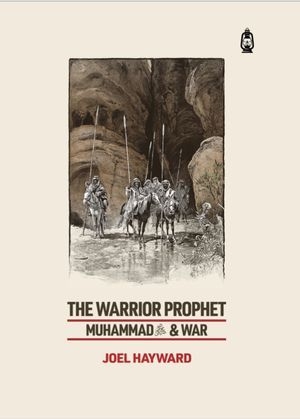Prof. Joel Hayward's Books and Articles
Professor Joel Hayward, ZDaF, BA, MA Hons, PhD, FRSA, FRHistS
The Warrior Prophet: Muhammad and War
(This is a copyright free image. The author Joel Hayward has placed this image in the public domain for use without licenses or restrictions and has waived all rights to the work worldwide under copyright law, including all related and neighboring rights, to the extent allowed by law.)
The Warrior Prophet: Muhammad and War
by Professor Joel Hayward
Given the Prophet Muhammad’s immense impact on history, surprisingly few books specifically analyze his understanding and employment of warfare as an economically, politically and socially transformational process, even though he was continuously at war for a decade and initiated around eighty armed missions, twenty-seven of which he led himself. Most Islamic biographies deal with this issue by using an understandable but insufficient logic: that because Muhammad, as the Messenger of Allah, was the ideal and paradigmatic human, he must have been an ideal and paradigmatic military commander. His successes flowed from his prophetic status and his moral perfection. Following this logic, and wanting Muhammad’s behavior to conform to very modern ethical concepts and widespread (but not necessarily accurate) beliefs about the nature and conduct of war, the writers have inadvertently created a narrative which, in significant ways, departs from the account clearly and consistently revealed in the earliest extant Arabic sources. The writers’ narrative also removes the Prophet from his historical and cultural context and the realities of the harsh and competitive tribal society in which he lived.
Professor Joel Hayward sees this as an unhelpful explanatory tendency and believes that the modern depiction of the Prophet’s relationship with warfare — which presents him as being rather antipathetic to war, indeed as virtually a pacifist who only fought reluctantly in self-defense — cannot actually be sustained by an even-handed analysis of the early Islamic sources. A committed Muslim himself, Hayward agrees that Muhammad was a moral and decent man who saw peace as a highly desirable state in which humans should live and as a goal worth pursuing. Yet Hayward has approached the Prophet’s understanding and employment of warfare from a different vantage point. He has painstakingly scrutinized the earliest Arabic sources impartially according to the strict standards of historical inquiry in order to ascertain whether Muhammad’s actions, habits and methods can — when understood within their original seventh-century stateless Arabian context — provide any substantial and meaningful insights into the way that he understood and undertook warfare.
Hayward concludes that Muhammad was an astute, situationally aware and self-reflective man who created and communicated a believable strategic vision of a necessary and desirable future. That vision persuaded increasing numbers of people to follow him and risk everything willingly in the struggle to create the optimal conditions for their survival, security and prosperity. In a competitive and conflictual environment with ubiquitous threats, warfare was necessary to make real the bold new world that he foresaw. Through original, meticulously researched and rigorous analysis, Hayward covers all the raids and campaigns and demonstrates that Muhammad correctly understood the necessity and utility of force and duly developed into an intuitive, effective and victorious military practitioner who developed and enforced a strict moral code so as to attain his goals whilst safeguarding the innocent. This engaging, accessible yet deeply scholarly book makes a major contribution to strategic and military analysis and to the Prophet’s biography.
Reviews
A five-star review in BookViral Reviews states: “Joel Hayward sets aside religious fervor and hearsay in his impeccably and intensively researched book, The Warrior Prophet Muhammad and War. Rather than offering sentimentality and thinly veiled assumptions, it represents a comprehensive and evidence-based historical account of the Prophet Muhammad and his God-sanctioned warfare, fought in the name of Allah. …Hayward’s tireless study is evidenced in his superbly executed academic writing, as he brings together the threads of past documentation and artefacts, shaping his words into a fully rounded account. With the fascinating backdrop of customs, practices and beliefs of the peoples of that time period, Hayward brings the Prophet Muhammad to life, focusing on his motivations and movements as he wielded great strength and power throughout the east, fighting alongside his soldiers in his God-ordained role. … Complete with comprehensive and extensive referencing, The warrior Prophet: Muhammad and War is unreservedly recommended as a historically accurate fully researched work detailing the life and times of the Prophet Muhammad."
Advance Praise for The Warrior Prophet: Muhammad and War:
“Meticulously researched and carefully argued, this groundbreaking book is both highly informative and deeply thought-provoking. It should be required reading for anyone seeking to learn about the life and times of the Prophet.”
— Prof. Mohammad Hassan Khalil, author of Islam and the Fate of Others: The Salvation Question
“This is a courageous scholarly investigation into the classical sources to provide historical analysis of key cultural practices, experiences, norms and values of raids and warfare during seventh century Arabia and broader region. As an expert on war and strategic studies, Prof. Hayward insightfully illustrates the decision-making process and rationale, as well as the multidimensional complex relationships involved in tribal politics and the emerging polity of the Prophet in Medina. The Warrior Prophet: Muhammad and War meticulously examines primary sources of al-Ṭabarī, Ibn Hishām, and other key sources. Prof. Hayward’s work exemplifies excellent re-examination of historical sources to move beyond mythic imagery of the past but to bring a deeper understanding of how the complex decisions of war were calculated, implemented, and understood by the Prophet and the early Muslim community. This is an outstanding contribution to the broader work of conflict, war, and the limitations of war in early Islamic history.”
— Dr. Qamar-ul Huda, author of Peacebuilding and Conflict Resolution in Islam

